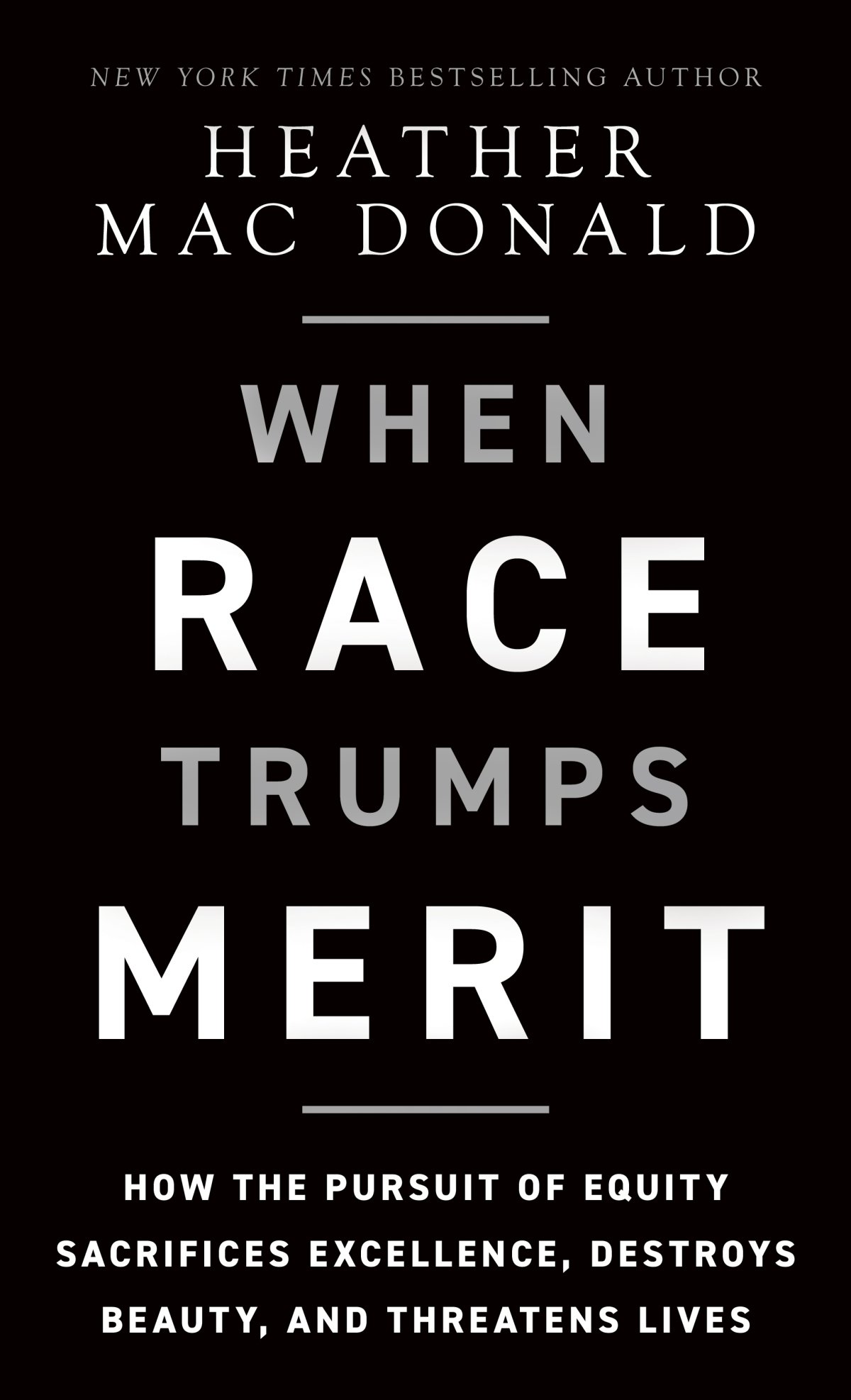🎙️ Voice is AI-generated. Inconsistencies may occur.
The following is an excerpt from Heather Mac Donald's new book, When Race Trumps Merit: How the Pursuit of Equity Sacrifices Excellence, Destroys Beauty, and Threatens Lives, published by DW Books.
The post–George Floyd racial reckoning hit the field of medicine like an earthquake. Medical education, medical research, and standards of competence have been upended by two related hypotheses: that racial disparities in the demographics of the medical profession and racial disparities in health outcomes are the products of systemic racism. Questioning those hypotheses is professionally suicidal. Vast sums of public and private research funding are being redirected from basic science to political projects aimed at dismantling white supremacy. The result will be a declining quality of medical care and a curtailment of scientific progress.

Virtually every major medical organization—from the American Medical Association (AMA) and the American Association of Medical Colleges (AAMC) to the American Association of Pediatrics (AAP)—has embraced the idea that medicine is an inequity-producing enterprise. The AMA's 2021–2023 Organizational Strategic Plan to Embed Racial Justice and Advance Health Equity is virtually indistinguishable from a black studies department mission statement. The plan plunges the reader into a thicket of social-justice maxims: Physicians must "confront inequities and dismantle white supremacy, racism, and other forms of exclusion and structured oppression, as well as embed racial justice and advance equity within and across all aspects of health systems." The country needs to pivot "from euphemisms to explicit conversations about power, racism, gender and class oppression, forms of discrimination and exclusion." (The reader may puzzle over how much more "explicit" current "conversations" about racism can be.) We need to discard "America's stronghold of false notions of hierarchy of value based on gender, skin color, religion, ability and country of origin, as well as other forms of privilege."
A key solution to this alleged oppression, according to the AMA, is identity-based preferences throughout the medical profession. The AMA strategic plan calls for the "just representation of Black, Indigenous and Latinx people in medical school admissions as well as . . . leadership ranks." The lack of "just representation," according to the AMA, is due to deliberate "exclusion," which will end only when we have "prioritize[d] and integrate[d] the voices and ideas of people and communities experiencing great injustice and [those who are] historically excluded, exploited, and deprived of needed resources such as people of color, women, people with disabilities, LGBTQ+, and those in rural and urban communities alike."

According to medical and STEM leaders, to be white is to be racist per se; apologies and reparations for that offending trait are now expected. In June 2020, the journal Nature identified itself as one of the culpably "white institutions that is responsible for bias in research and scholarship." In January 2021, the editor-in-chief of Health Affairs lamented that "our own staff and leadership are overwhelmingly white." The AMA's strategic plan blames "white male lawmakers" for America's systemic racism.

And so medical schools and medical societies are discarding traditional standards of merit in order to alter the demographic characteristics of their profession. As with all disparate impact analyses, that demolition of standards rests on an a priori truth: that there is no academic skills gap between whites and Asians, on the one hand, and blacks and Hispanics, on the other. Therefore, any test or evaluation on which blacks and Hispanics score worse than whites and Asians is biased and should be eliminated.
The United States Medical Licensing Exam (USMLE) is a prime offender. At the end of their second year of medical school, students take Step One of the USMLE, which measures knowledge of the body's anatomical parts, their functioning, and their malfunctioning; topics include biochemistry, physiology, cell biology, pharmacology, and the cardiovascular system. High scores on Step One predict success in a residency; highly sought-after residency programs, such as surgery and radiology, use Step One scores to help select applicants.
Black students are not admitted into competitive residencies at the same rate as whites because their average Step One test scores are a standard deviation below those of whites, representing, in statistical terms, a massive gap. (Standard deviation measures how dispersed data are from a mean.) Step One has already been modified to try to shrink that gap; it now includes nonscience components such as "communication and interpersonal skills." But the standard deviation in scores has persisted. In the world of anti-racism, that persistence means only one thing: The test is to blame. It is Step One that, in the language of anti-racism, "disadvantages" underrepresented minorities, not a lesser degree of medical knowledge.
The Step One exam has a further mark against it. The pressure to score well inhibits minority students from what has become a core component of medical education: anti-racism advocacy. A fourth-year Yale medical student describes how the specter of Step One affected his priorities. In his first two years of medical school, the student had "immersed" himself, as he describes it, in a "student-led committee focused on diversity, inclusion, and social justice." The committee lobbied the administration for changes in the curriculum, the admissions process, and research funding. The student ran a podcast about health disparities. All that political work was made possible by Yale's pass-fail grading system, which meant that he didn't feel compelled to put studying ahead of diversity concerns. Then, as he tells it, Step One "reared its ugly head." Getting an actual grade on an exam might prove to "whoever might have thought it before that [he] didn't deserve a seat at Yale as a Black medical student," the student worried.
The solution to such academic pressure was obvious: abolish Step One grades. Since January 2022, Step One has been graded on a pass-fail basis. The fourth-year Yale student can now go back to his diversity activism without worrying about what a graded exam might reveal. Whether his future patients will appreciate his focus is unclear.
Medical school bureaucrats cheer on this reorientation to advocacy. A career advisory dean at the George Washington University School of Medicine & Health Sciences describes a conversation she had with a student who had done so poorly on her Step One test that she would have a hard time "matching" (med-school argot for landing) her preferred residency in obstetrics and gynecology. The advisor insisted that the student's test scores were less important than her "passion for social justice." (How that passion might help a doctor treat a uterine rupture during delivery is also unclear.) In the career advisor's view, the student's "feelings of incompetence" were arbitrary and unjustified. Yet they were "impacting" the student's clinical performance. Arguably, it was the student's struggles with core science concepts that were impacting her clinical performance. No matter. Making Step One pass/fail will help students more "effectively tell their stories to residency programs," since it is apparently a student's "story" that hospitals should use in selecting interns.
Every other measure of academic mastery has a disparate impact on blacks and thus is in jeopardy.
Heather Mac Donald is the Thomas W. Smith fellow at the Manhattan Institute and the author of When Race Trumps Merit: How the Pursuit of Equity Sacrifices Excellence, Destroys Beauty, and Threatens Lives.
The views expressed in this article are the writer's own.



